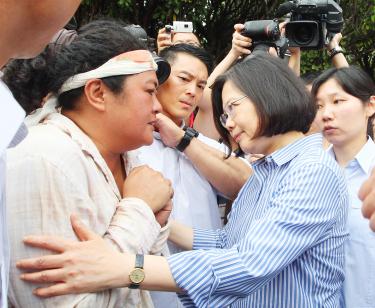President Tsai Ing-wen (蔡英文) yesterday unexpectedly visited a group of Aboriginal rights activists staging a protest on Ketagalan Boulevard in front of the Presidential Office Building in Taipei, personally answering their questions and promising to help Aborigines to “be themselves.”
At a tent set up by the protesters the president sat down with the activists at about 3:30pm and chatted with them.
Mayaw Wutaw of the Amis, who traveled to Taipei from Pingtung County on foot and collected the thoughts of Aboriginal elders along the way, said that he did so because he wanted the president to know that the government’s repression of Aborigines is still ongoing, even though it may not be visible.
For example, many Aboriginal communities are banned from staying in their traditional domains and are penalized when trying to utilize resources in those domains, he said.
Amis singer-activist Panai Kusui told Tsai that the nation should embrace diversity.
“Those who live in the mountains should know the mountains and those who live by the ocean should know the ocean, but our education has trained us to become Han Chinese, we learned the Han culture and language, and lost our roots. We are standing up because we want to become who we are,” she said.
Responding to the complaints, Tsai said that perhaps her apology did not satisfy everyone, but she urged the activists to believe in her government’s determination.
Answering calls for the commission on Aboriginal transitional justice to have investigative powers, Tsai said that she would first set up the commission and then make amendments as required.
On calls for Aboriginal issues to be included in the bill on transitional justice, Tsai said that since there are many issues unique to Aborigines, it would not be suitable for that bill to include Aboriginal issues.
“I think we can only deal with Aboriginal issues when we have a separate law specifically targeting transitional justice issues for Aborigines,” Tsai said.
The conversation lasted for about half an hour and after the meeting Panai Kusui said that she felt Tsai was sincere, but she and her fellow activists would continue to monitor the government’s actions.
Mayaw Biho, former director of Taiwan Indigenous Peoples TV and an Amis activist, said that it is acceptable to have two separate laws on transitional justice, but the two mechanisms must operate simultaneously.
“Unless there is a passage of transitional justice legislation for Aborigines granting investigative powers to the commission, her apology is just fake,” he said at a news conference on Ketagalan Boulevard in the morning.
While Tsai has promised to personally head the commission, activists questioned her administration’s resolve to publicize past abuses and provide compensation, citing differences between the proposed Aboriginal transitional justice commission and a proposed transitional justice commission targeting Martial Law-era abuses.
Salone Ishahavut, a professor of indigenous development at National Chi Nan University and member of the Bunun, said that true transitional justice for Aborigines would require an official government investigation into past injustices to provide a foundation for affixing responsibility and settling accounts, including providing compensation and passing institutional reforms.
“Not only will the transitional justice commission [for Martial Law-era abuses] have a formal legal foundation, it will have a fixed budget, while the Aboriginal transitional justice commission’s budget will have to be appropriated ad hoc from existing budgetary items,” she said.
Aboriginal transitional justice commission members would work only part-time and without pay, while the Martial Law-era transitional justice commission would be full-time and paid, she added.
Source: Taipei Times - 2016/08/04





















